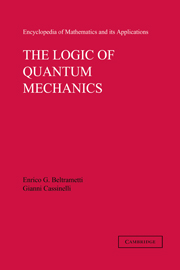Book contents
- Frontmatter
- Contents
- Editor's Statement
- Foreword
- Preface
- The Logic of Quantum Mechanics
- Part I HILBERT-SPACE QUANTUM MECHANICS
- Chapter 1 Static Description of Quantum Systems
- Chapter 2 States
- Chapter 3 Physical Quantities
- Chapter 4 Spin and Motion
- Chapter 5 Superselection Rules
- Chapter 6 Dynamical Evolution
- Chapter 7 Compound System
- Chapter 8 Elementary Analysis of the Measurement Process
- Chapter 9 Mathematical Structures Emerging from the Hilbert-Space Formulation of Quantum Mechanics
- Part II BASIC STRUCTURES IN THE DESCRIPTION OF QUANTUM SYSTEMS
- Part III RECONSTRUCTION OF HILBERT-SPACE QUANTUM MECHANICS
- Appendix A Trace-Class Operators
- Appendix B The Spectral Theorem
- Appendix C Proofs for Chapter 11
- Subject Index
- Miscellaneous Endmatter
Chapter 7 - Compound System
Published online by Cambridge University Press: 05 June 2013
- Frontmatter
- Contents
- Editor's Statement
- Foreword
- Preface
- The Logic of Quantum Mechanics
- Part I HILBERT-SPACE QUANTUM MECHANICS
- Chapter 1 Static Description of Quantum Systems
- Chapter 2 States
- Chapter 3 Physical Quantities
- Chapter 4 Spin and Motion
- Chapter 5 Superselection Rules
- Chapter 6 Dynamical Evolution
- Chapter 7 Compound System
- Chapter 8 Elementary Analysis of the Measurement Process
- Chapter 9 Mathematical Structures Emerging from the Hilbert-Space Formulation of Quantum Mechanics
- Part II BASIC STRUCTURES IN THE DESCRIPTION OF QUANTUM SYSTEMS
- Part III RECONSTRUCTION OF HILBERT-SPACE QUANTUM MECHANICS
- Appendix A Trace-Class Operators
- Appendix B The Spectral Theorem
- Appendix C Proofs for Chapter 11
- Subject Index
- Miscellaneous Endmatter
Summary
Composition of Different and of Identical Systems
It is a general tendency of physics to interpret physical systems as composed of simpler, more elementary subsystems. The question “What is it made of?” is a very tempting and popular one. Though this attitude does not reflect a logical necessity, it has proved to be successful in significant circumstances: we think, e.g., of macroscopic matter as composed of atoms and molecules, of molecules as composed of atoms, of atoms as composed of nuclei and electrons, and of nuclei as composed of protons and neutrons. Loosely speaking, one might expect that this attitude will be successful whenever the interaction that packs the constituent subsystems together is not strong enough to make them lose their identity.
Here, we are concerned with the problem of constructing the quantum-mechanical formalism of a compound system knowing the formalisms of the constituent subsystems. Thus our first problem is to specify the Hilbert space of the compound system. For the sake of simplicity, let us restrict ourselves to the case of a system composed of only two subsystems.
The prescriptions of quantum theory vary according to whether one is faced with the composition of identical or nonidentical subsystems.
- Type
- Chapter
- Information
- The Logic of Quantum Mechanics , pp. 61 - 76Publisher: Cambridge University PressPrint publication year: 1984

